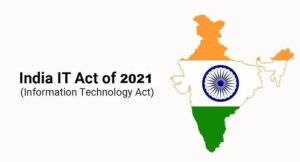“Explore the comprehensive insights into the Information Technology Act 2021, delving into its key provisions, impacts, challenges, and implications for the digital landscape. Discover how this pivotal legislation shapes data protection, cybersecurity, digital governance, and more, setting the stage for a secure, inclusive, and rights-respecting digital ecosystem.
In the ever-evolving landscape of technology, legislation plays a crucial role in shaping digital environments and safeguarding the interests of all stakeholders involved. One such significant piece of legislation is the Information Technology Act 2021, which seeks to address contemporary challenges in the digital realm while ensuring the protection of users’ rights and privacy.

Introduction to the Information Technology Act 2021
The Information Technology Act 2021 is a comprehensive legislative framework designed to govern various aspects of the digital domain, including electronic transactions, cybersecurity, data protection, and digital governance. Enacted as a response to the growing complexities of the digital age, the act aims to provide a legal framework that fosters innovation, promotes trust in online transactions, and addresses emerging threats in cyberspace.
Key Provisions of the Information Technology Act 2021
1. Data Protection and Privacy:One of the pivotal aspects of the IT Act 2021 is its emphasis on data protection and privacy. The act establishes stringent guidelines for the collection, storage, and processing of personal data by entities operating in the digital space. It outlines the rights of individuals regarding their personal information and imposes obligations on organizations to ensure the secure handling of data.
2. Cybersecurity Measures: Recognizing the importance of cybersecurity in safeguarding digital infrastructure and preventing cyber threats, the IT Act 2021 mandates stringent cybersecurity measures for both public and private entities. This includes provisions for the establishment of cybersecurity frameworks, incident reporting mechanisms, and the protection of critical information infrastructure.
3. Regulation of Digital Platforms: With the proliferation of digital platforms and online services, the IT Act 2021 introduces provisions to regulate the operations of digital intermediaries. It delineates the responsibilities of intermediaries in moderating content, addressing grievances, and complying with regulatory requirements to ensure a safe and secure online environment.
4. Electronic Transactions:Facilitating electronic transactions is another key focus area of the IT Act 2021. The act provides legal recognition and validity to electronic contracts, digital signatures, and electronic records, thereby enabling the seamless conduct of business in the digital realm while ensuring legal certainty and enforceability.

5. E-Governance and Digital Empowerment: In line with the government’s vision of digital transformation and inclusive governance, the IT Act 2021 promotes e-governance initiatives and digital empowerment programs aimed at enhancing access to digital services, promoting digital literacy, and bridging the digital divide across different segments of society.
Impact and Implications
The enactment of the Information Technology Act 2021 carries significant implications for various stakeholders, including governments, businesses, consumers, and civil society. Some of the key impacts of the act are:
1. Enhanced Data Protection:The stringent data protection provisions under the IT Act 2021 are expected to bolster consumer confidence in digital transactions and foster a culture of trust and transparency in data handling practices.
2. Strengthened Cybersecurity Infrastructure: By mandating robust cybersecurity measures and incident reporting mechanisms, the act aims to enhance the resilience of digital infrastructure and mitigate the risks posed by cyber threats and attacks.
3. Regulatory Compliance Challenges: Compliance with the provisions of the IT Act 2021 may pose challenges for businesses, particularly small and medium enterprises (SMEs), in terms of resource allocation, technological capabilities, and operational adjustments.
4. Empowerment of Digital Intermediaries:While imposing certain obligations on digital intermediaries, the act also seeks to empower them with legal safeguards and regulatory clarity, thereby enabling them to play a more constructive role in fostering a safe and inclusive online environment.
5. Promotion of Digital Rights:The IT Act 2021 reinforces the importance of upholding digital rights and freedoms, including the right to privacy, freedom of expression, and access to information, thereby setting a precedent for other jurisdictions grappling with similar issues.
Challenges and Considerations
Despite its progressive objectives, the implementation of the Information Technology Act 2021 is not without challenges and considerations. Some of the key challenges and considerations include:
1. Ensuring Effective Enforcement: The effectiveness of the act hinges on the efficient enforcement of its provisions, which requires adequate resources, technological capabilities, and collaboration between various stakeholders, including law enforcement agencies, regulatory bodies, and the judiciary.
2. Balancing Rights and Responsibilities: Balancing the rights of individuals with the responsibilities of digital intermediaries and other stakeholders poses a delicate challenge, requiring careful consideration of competing interests and evolving societal norms.
3. Adaptability to Technological Advances: The rapid pace of technological innovation necessitates continuous updates and revisions to the legislative framework to keep pace with emerging trends and address new challenges in the digital landscape.
4. International Cooperation and Harmonization:Given the borderless nature of cyberspace, effective regulation requires international cooperation and harmonization of legal standards to address transnational cyber threats and promote interoperability between different legal regimes.

Whatsapp Problem
The intersection of WhatsApp and the Information Technology Act 2021 in India presents several challenges and considerations. One prominent issue revolves around data privacy and the contentious debate over WhatsApp’s updated privacy policy, which raised concerns about the collection and sharing of user data with its parent company, Facebook. While WhatsApp maintains that the policy changes primarily focus on business messaging and do not compromise the privacy of personal conversations, critics argue that the revised policy undermines user privacy rights and violates the principles outlined in the IT Act 2021.
Additionally, WhatsApp’s encryption policies have sparked debates regarding the balance between privacy and national security. While end-to-end encryption ensures the privacy and security of user communications, it also poses challenges for law enforcement agencies in combating cybercrime and ensuring public safety. This tension between privacy and security underscores the need for nuanced regulatory frameworks that reconcile competing interests while upholding fundamental rights and principles outlined in the IT Act 2021.
Furthermore, the proliferation of misinformation and fake news on WhatsApp has emerged as a significant challenge, prompting calls for greater accountability and transparency from the platform. The IT Act 2021 imposes obligations on digital intermediaries to moderate content and address grievances effectively. However, the scale and complexity of misinformation on WhatsApp present formidable challenges in terms of content moderation, algorithmic accountability, and user empowerment.
In light of these challenges, the evolving regulatory landscape in India, including the IT Act 2021 and other pertinent regulations, will play a crucial role in shaping the future of WhatsApp and its operations in the country. Balancing innovation, privacy, security, and freedom of expression will require a collaborative approach involving policymakers, industry stakeholders, civil society, and users to navigate the complex dynamics of the digital age.
Conclusion
The Information Technology Act 2021 represents a significant milestone in the journey towards creating a secure, inclusive, and rights-respecting digital ecosystem. By addressing key challenges and opportunities in the digital domain, the act lays the groundwork for fostering innovation, promoting trust, and safeguarding the interests of all stakeholders involved. However, its successful implementation hinges on effective enforcement, stakeholder collaboration, and ongoing adaptation to the evolving dynamics of the digital age.
Disclaimer: The information provided in this blog is for general informational purposes only. While efforts have been made to ensure the accuracy and reliability of the information presented, it should not be construed as legal advice or relied upon as a substitute for professional legal guidance. The interpretation and application of laws, including the Information Technology Act 2021, may vary depending on specific circumstances and jurisdictional nuances. Readers are advised to seek independent legal counsel or consult relevant authorities for personalized advice tailored to their particular situation. The views and opinions expressed in this blog are those of the author and do not necessarily reflect the official policy or position of any organization or entity mentioned.



